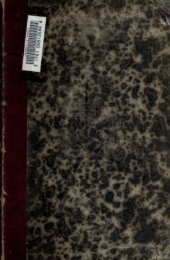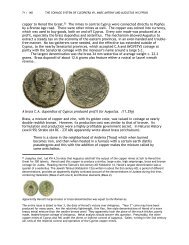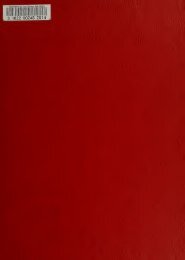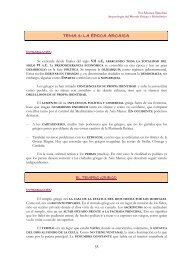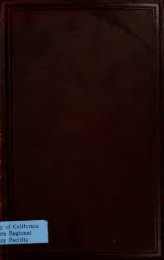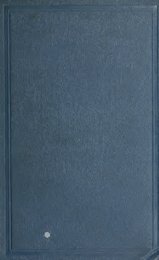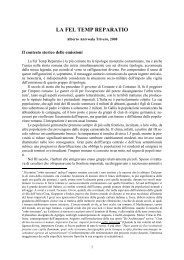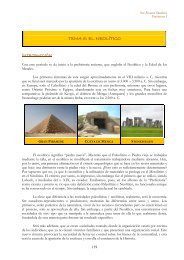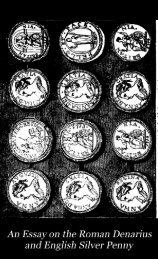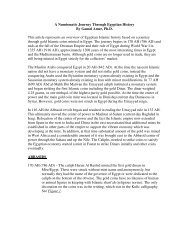Numismata hellenica: a catalogue of Greek coins; with notes, a map ...
Numismata hellenica: a catalogue of Greek coins; with notes, a map ...
Numismata hellenica: a catalogue of Greek coins; with notes, a map ...
You also want an ePaper? Increase the reach of your titles
YUMPU automatically turns print PDFs into web optimized ePapers that Google loves.
his nephew Eumenes ; his deified portrait the obverse<br />
<strong>of</strong> all the <strong>coins</strong> <strong>of</strong> the dynasty, K. 43 : one coin<br />
seemingly an exception to tins rule, K. 44.<br />
Philip II. <strong>of</strong> Macedonia, Hercules and not Apollo represented<br />
on the obverses <strong>of</strong> his gold <strong>coins</strong> ; error <strong>of</strong><br />
Eckhel on this point; the biga on the reverses allu-<br />
sive to his Olympic victories ; copper money struck by<br />
him, K. 3 : the capital <strong>of</strong> Macedonia removed by him<br />
from JEgx to Pella, K. 4.<br />
III. <strong>of</strong> Macedonia, all the <strong>coins</strong> inscribed Bao-iXIwc<br />
*iXi'7r7rou coined by him or by the fourth or fifth Phihp,<br />
K. 9.<br />
IV. <strong>of</strong> Macedonia, rareness <strong>of</strong> his <strong>coins</strong> not sur-<br />
prising in consequence <strong>of</strong> the shortness <strong>of</strong> his reign,<br />
K. 10.<br />
V. <strong>of</strong> Macedonia, claims descent from Perseus ;<br />
assumes on his <strong>coins</strong> the attributes <strong>of</strong> the Argive<br />
hero ; confirmed in his pretensions by the management<br />
<strong>of</strong> the Hersean and Nemaean games being given to him<br />
by the people <strong>of</strong> Argos, K. 15.<br />
(Epiphanes, Philadelphus) <strong>of</strong> Syria : reigns in<br />
conjunction <strong>with</strong> his brother Demetrius III. ; is over-<br />
thrown by Tigranes, K. 3/.<br />
Philippeia, all the gold didrachma <strong>of</strong> the Macedonian kings<br />
so called after Philip II., by whom they were first<br />
coined : immense quantity <strong>of</strong> them brought to Rome ;<br />
a crown made <strong>of</strong> 20,000 <strong>of</strong> them presented to Rome<br />
by Pamphylia, K. 4.<br />
Philippi (Macedoniae), formerly Crenides, in the district<br />
<strong>of</strong> Datus ; its new name received from Philip II., after<br />
his discovery <strong>of</strong> the neighbouring gold mines, Eu. 90.<br />
Philippopolis (Arabise) founded by the emperor Philip,<br />
who was a native <strong>of</strong> the neighbouring Bostra, As. 100.<br />
, Gomphi Thessalise and ThebsB Phthioticse<br />
both so named by Philip, son <strong>of</strong> Demetrius, Eu. 91.<br />
-, (Thraciie,) still so called; named from Philip<br />
II. <strong>of</strong> Macedonia; the Roman Trimontium; the Hebrus<br />
and its two branches which joined it at Philippopolis<br />
personified on its <strong>coins</strong> ; the mountains Rhodope and<br />
Htemus <strong>with</strong> the Porta Trajana between them also<br />
represented on them, Eu. 92.<br />
Philistion, numismatic artist <strong>of</strong> Hyele (Velia), Eu. 123.<br />
Philistis, wife <strong>of</strong> Hieron II., and a descendant <strong>of</strong> the historian<br />
Philistus (?), Ins. 77.<br />
Philomelium (Phrygise), reasons for supposing its remains<br />
to be at Ak-Sheher, As. 100.<br />
Philometor, epithet <strong>of</strong> Ariarathes VII. <strong>of</strong> Cappadocia,<br />
K. 46 : and <strong>of</strong> Ptolemy VI. <strong>of</strong> Egypt, K. 61.<br />
Philopappus, grandson <strong>of</strong> Antiochus IV. <strong>of</strong> Commagene,<br />
his monument still extant at Athens, K. 39.<br />
Philopator, epithet <strong>of</strong> Seleucus IV. <strong>of</strong> Syria, K. 26 : <strong>of</strong><br />
Antiochus IX. and X., K. 35, 36 : <strong>of</strong> Demetrius III.<br />
and Antiochus XII., K. 37: <strong>of</strong> Nicomedes III. <strong>of</strong><br />
Bithynia, K. 42: <strong>of</strong> Ariarathes V. and Ariobarzanes II.<br />
<strong>of</strong> Cappadocia, K. 45, 46 : <strong>of</strong> Ptolemaeus IV. <strong>of</strong> Egypt<br />
and his wife Arsinoe, K. 61.<br />
Philoromseus, epithet <strong>of</strong> Ariobarzanes I. <strong>of</strong> Cappadocia,<br />
K. 46.<br />
Philoxenus, coin <strong>of</strong> a king <strong>of</strong> Bactria <strong>of</strong> that name, K. 56.<br />
Phintias, now Licata or Alicata, at the mouth <strong>of</strong> the Himera,<br />
founded by Phintias<br />
and populated from Gela,<br />
Phintias, Ins. 57. 67.<br />
<strong>of</strong> Acragas about 2S2 b.c,<br />
which was destroyed by<br />
Phistelia (Campanise), in Oscan Phistluis, a Campanian<br />
city founded by the Tyrrheni, situated probably between<br />
the Vulturnus and Cumse, Eu. 135.<br />
Phlius (Achaise), one <strong>of</strong> its <strong>coins</strong> as member <strong>of</strong> the Achaian<br />
League, Eu. 4 : its remains at Polyfengo ; Asopus typified on its <strong>coins</strong>, Eu. 92.<br />
the river<br />
INDEX TO THE NOTES. [33<br />
Phocaea (loniae), its temple <strong>of</strong> Minerva, one <strong>of</strong> the most<br />
ancient in Greece, burnt by Harpagus the Mede,<br />
As. 101.<br />
Phocis, its <strong>coins</strong>, Eu. 93.<br />
Phoenice (Epiri), vestiges <strong>of</strong> it at Finiki, Eu. 93.<br />
Phoenician language found on <strong>coins</strong> <strong>of</strong> Tarsus Cilicise as<br />
late as the Seleucidse, As. 127.<br />
Phrahates <strong>of</strong> Parthia releases Demetrius II. <strong>of</strong> Syria when<br />
himself attacked by Antiochus Sidetes, K. 31.<br />
Phriconis, surname <strong>of</strong> the city Larissa ^Eolidis, As. 75.<br />
Phrygian language and character, specimens <strong>of</strong> them still<br />
extant, As. 28. 86.<br />
Phygela (Ionise), description <strong>of</strong> one <strong>of</strong> its <strong>coins</strong>. As. 151.<br />
Phylacis and Phylandrus, children <strong>of</strong> Acacallis and Apollo,<br />
represented at Delphi as being suckled by a goat ; allusion<br />
to this mythus on <strong>coins</strong> <strong>of</strong> Elyrus Cretse, Ins. 17.<br />
Physcon, See<br />
Ptolemy.<br />
Ptolemasus VII. <strong>of</strong> Egypt.<br />
Pierium (Thessalise). See Cierium Thessalias.<br />
Pimolisa (Ponti), description <strong>of</strong> one <strong>of</strong> its <strong>coins</strong>. As. 151.<br />
Pincum (Moesiae Superioris), its position uncertain,<br />
Eu. 163.<br />
Pistrix or i:^r<strong>of</strong> , a symbol <strong>of</strong> Neptune, represented on the<br />
<strong>coins</strong> <strong>of</strong> Acragas Sicilise, Cumse, Posidonia, and other<br />
places, Ins. 49.<br />
Pitane (Mysise) now Sandarlik ; its types the head <strong>of</strong><br />
Jupiter Ammon and the pentagon, a symbol <strong>of</strong> the<br />
worship <strong>of</strong> iEsculapius, As. 101.<br />
Pittacus. See Edoni.<br />
Pixodarus, satrap <strong>of</strong> Halicarnassus and Caria, expels his<br />
sister Ada, As. 63 : change <strong>of</strong> the written form<br />
<strong>of</strong> the genitive from O to OY made in his time. As.<br />
64.<br />
Plarasa (Cariae), no <strong>coins</strong> <strong>of</strong> it as an independent state ;<br />
joined Aphrodisias in the second century b.c. in consequence<br />
<strong>of</strong> the decline <strong>of</strong> the two places; its name not<br />
found on <strong>coins</strong> or inscriptions after the time <strong>of</strong> Augustus,<br />
As. 101.<br />
Platsese (Boeotise), its remains at Kokla, Eu. 94.<br />
Pleminius, the lieutenant <strong>of</strong> P. Scipio, plunders the temple<br />
<strong>of</strong> Proserpine at Locri, Eu. 1 27.<br />
Pleuratus king <strong>of</strong> Illyria, Eu. 159.<br />
Podares distinguished by his bravery at the battle <strong>of</strong> Mantineia<br />
his heroura in the ;<br />
agora <strong>of</strong> Mantineia, Eu. 69.<br />
Poeeessa (Ceae), now Pises, a harbour <strong>with</strong> ruins on the<br />
western coast <strong>of</strong> Cea ; its <strong>coins</strong> extant, Ins. 5.<br />
<strong>of</strong> one <strong>of</strong> its<br />
autonomous <strong>coins</strong> ;<br />
Poemaneni (Mysiae), now Manias, description<br />
others extant <strong>of</strong> the reign <strong>of</strong> Trajan,<br />
As. 151.<br />
Pogon, an epithet <strong>of</strong> Seleucus II. <strong>of</strong> Syria, reason there<strong>of</strong>,<br />
K. 24.<br />
Polemon I. son <strong>of</strong> the rhetorician Zeno <strong>of</strong> Laodiceia Phrygise,<br />
As. 73 : made king <strong>of</strong> Pontus by M. Antonius, As.<br />
121 ; <strong>coins</strong> <strong>of</strong> this king extant, K. 47.<br />
II., king <strong>of</strong> Pontus, founder <strong>of</strong> Polemonium on<br />
the Euxine ; Pontus reduced to a Roman province after<br />
his abdication in a.d. 62 ; receives a part <strong>of</strong> Cilicia in<br />
lieu <strong>of</strong> the kingdom <strong>of</strong> Bosporus from the Emperor<br />
Claudius, K. 48.<br />
the sophist, <strong>coins</strong> dedicated by him to the<br />
Smyrnaei, As. 121.<br />
Polemonium, a district <strong>of</strong> Pontus, its name preserved in<br />
that <strong>of</strong> the river Puleman-tehai, anciently the Sidenus,<br />
As. 41.<br />
Poliorcetes an epithet <strong>of</strong> Demetrius I. <strong>of</strong> Macedonia, K. 11.<br />
Polyanthes, a tributary <strong>of</strong> the river Amantia Epiri, Eu. 8.<br />
Aous, flowing by<br />
Polydectes turned into stone at Seriphus by Perseus for<br />
having ill-treated his mother Danae, Ins. 41.<br />
Polypcetes said in the <strong>catalogue</strong> <strong>of</strong> the Iliad to have been



